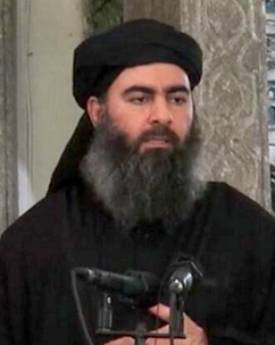 A rather long and detailed Brookings Institute essay on the background of Ibrahim al-Badri a.k.a. Abu Bakr al-Baghdadi, the ruler of the Islamic State or ISIS, or Daesh, depending on whether or not you style yourself as an intellectual, a media-type, or a realist.
A rather long and detailed Brookings Institute essay on the background of Ibrahim al-Badri a.k.a. Abu Bakr al-Baghdadi, the ruler of the Islamic State or ISIS, or Daesh, depending on whether or not you style yourself as an intellectual, a media-type, or a realist.Pertinent excerpts follow.
Baghdadi’s family is representative in many ways of the diversity of influences and ever-shifting allegiances that were required for survival in Saddam Hussein’s Iraq. Not only did they have ties to the Baathist party, if only for practical purposes, but there is evidence that several of Baghdadi’s family members, perhaps even his father, were Salafis—adherents of an extreme, puritanical form of Sunni Islam widely practiced in Saudi Arabia and throughout much of the Middle East, including Iraq, where it has deep roots. Muhammad ibn Abd al-Wahhab, the founder of the Saudi strain of Salafism, supposedly studied in the Iraqi city of Mosul in the 18th century, and individual Salafi missionaries spread their beliefs throughout Iraq in the 20th.
When Baghdadi graduated from the University of Baghdad in 1996, he enrolled in the recently-established Saddam University for Islamic Studies where he studied for a master’s in Quranic recitation, his favorite subject. His family’s Baathist connections undoubtedly helped him get into the highly-selective graduate program. Baghdadi’s master’s thesis was a commentary on an obscure medieval text on Quranic recitation. His task was to reconcile various versions of the manuscript. While tedious, it involved little imagination and no questioning of the content—a perfect project for a dogmatist. He received his master’s degree in 1999 and immediately enrolled in Saddam University’s doctoral program in Quranic studies.
During Baghdadi’s time in graduate school, his paternal uncle, Ismail al-Badri, persuaded him to join the Muslim Brotherhood, a transnational movement dedicated to establishing states governed by Islamic law. In most countries the Brotherhood, which has both liberal and conservative members, had adopted a cautious approach to political change, confined to working within the system. Many of the Brothers in Baghdad, including the ones Baghdadi fell in with at first, were peaceful Salafis who wanted states to impose Islamic law but didn’t advocate revolt if the states fail to do so. But Baghdadi quickly gravitated toward those few Salafis whose strict creed led them to call for the overthrow of rulers they considered betrayers of the faith. They called themselves jihadist Salafis. Baghdadi’s older brother, Jum`a, was part of this movement. So was Baghdadi’s mentor, Muhammad Hardan, a one-time member of the Brotherhood who had fought in the war against the Soviets in Afghanistan in the 1980s.